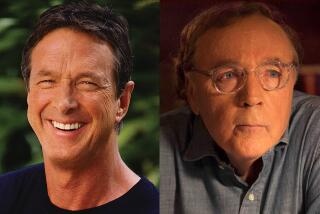BARRIER ISLAND <i> by John D. MacDonald (Knopf: $16.95; 229 pp.) </i>
- Share via
Prodigiously talented and prolific, John D. MacDonald writes intelligentthrillers about the real world. This time it is the world of real estate, theclubs and yachts of crooked developers and corrupt public officials who turn wasteland into gold mines by manipulating zoning laws and building permits, or by soaking the government. Remember the recent news reports that NASA had sold a building for $300,000 and then leasedit back for a yearly rent of more than a million? “Barrier Island” shows us how such transactions work and acquaints us with the white-collar criminals who pull them off.
The story is a fraudulent deal in the making. An uninhabitable barrier island in the Mississippi Sound, exceptionally rich in marine life, is about to be taken over by the National Parks Service. Tipped off by a friendly member of a congressional committee, the developer Tuck Loomis promptly buys the island for a pittance, planning to resell it to the government for a fortune. To drive up the price, Loomis concocts an elaborate scheme to prove that he was about to build a highly profitable residential housing development for millionaires on the drifting sands and is entitled to $10 million in compensation. MacDonald unfolds the plot with the dramatic flair of a master storyteller, and it would be unfair to give away anything more except to say that fraud eventually leads to murder--two murders, in fact, which like most crimes profit no one and go unsolved and unpunished. Everything in this novel has great verisimilitude.
A novelist whose books have sold more than 70 million copies is not suspected of literary virtues, yet MacDonald is far more gifted than many of his peers who are taken more seriously.
To begin with, MacDonald has the gift of moral vision, which is to say he portrays actions in the light of their consequences. This is an almost revolutionary approach in an age when every other book or film is romanticizing cruelty and unscrupulousness by concentrating on the charm of criminals rather than their crimes, and by making villains sympathetic and their victims repellent. In “Barrier Island” there is never any doubt who hurts whom and how. Nor are readers conned into loving the sort of characters who endanger their survival.
MacDonald is also gifted with a marvelous sense of irony. A real estate agent who “wanted to get too big too fast” because “he wanted to hear people whispering about him when he walked into a room” dooms himself to a horrible death with the utmost cunning and calculation. His more or less honest partner does his best to expose the fake development plan, but wants his share of the profits if it succeeds in spite of his efforts. Such insights are granted only to born writers who observe rather than invent.
There is a minute precision in the writing. MacDonald, who lives in Sarasota, Fla., sketches the laid-back life of golf, boating, long cool drinks, the peculiar callousness bred by hot climates and luxurious comfort, better than anybody since Graham Greene.
The judge who is to adjudicate the price the government will have to pay for the commercially valueless barrier island is bribed on the golf course; Tuck Loomis pays off the assistant U.S. attorney on his boat, after his morning swim. Whatever crimes the characters are perpetrating, they never stop cultivating their bodies.
The most chilling irony in the book, however, is that criminal conspiracies do less damage than the developers’ unthinking, uncaring but perfectly legal routine. Beyond the story of the scam there is the story of America being laid to waste.
“All they know is that if they are patient enough and generous enough and amiable enough, sooner or later they can pry some more fragile marshland from the politicians and take it away from the people forever . . . . They make enough to join the right clubs, drive the right cars and build their own homes overlooking the water . . . . And after they are dead, the damage they do goes on and on, visited on their descendants forevermore. Their great-grandchildren will live in a world that is drab, dirty, ugly and dangerous . . . sick and stinking.”
More to Read
Sign up for our Book Club newsletter
Get the latest news, events and more from the Los Angeles Times Book Club, and help us get L.A. reading and talking.
You may occasionally receive promotional content from the Los Angeles Times.










